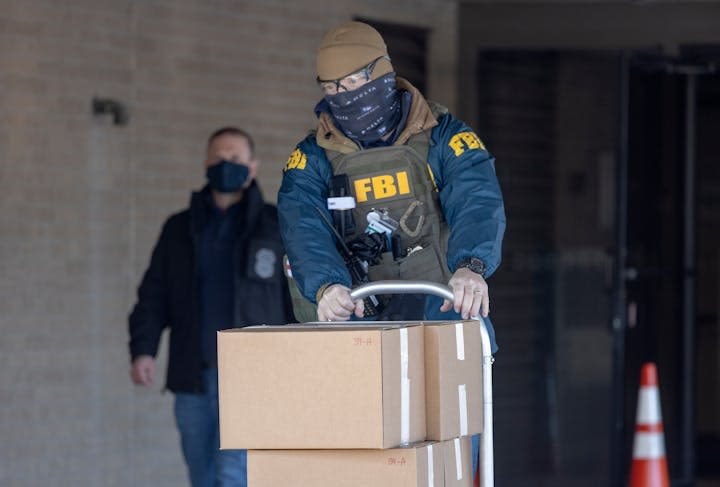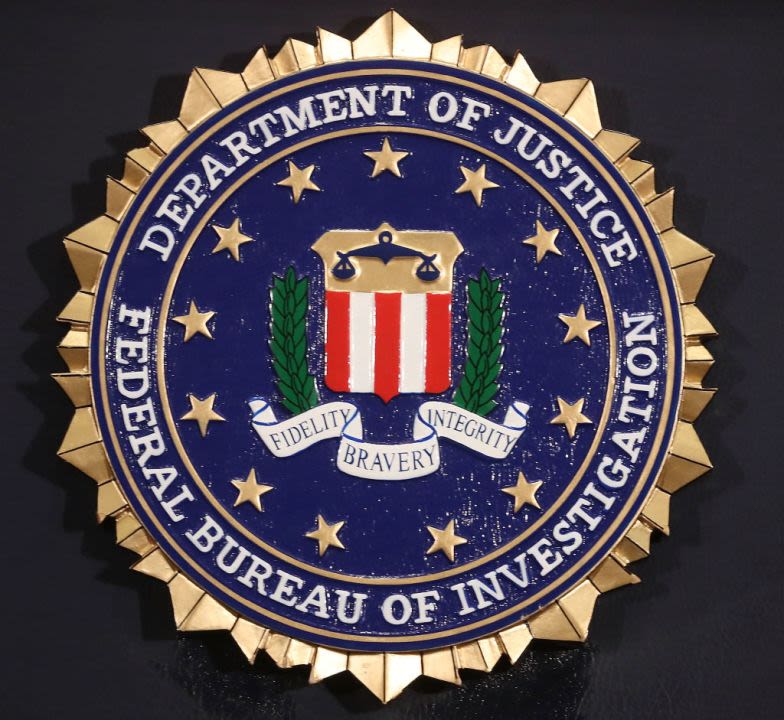Search results
Intelligence-driven and threat-focused national security organization
- The FBI is an intelligence-driven and threat-focused national security organization with both intelligence and law enforcement responsibilities. It is the principal investigative arm of the U.S. Department of Justice and a full member of the U.S. Intelligence Community.
www.fbi.gov › about › faqs
News about FBI, Feeding Our Future, Zeeko Zaki
News about FBI, China, Russia
News about FBI, Cleveland, Charlotte
Also in the news
People also ask
What is FBI about?
When did the FBI become a federal agency?
Who does the FBI report to?
The FBI is an intelligence-driven and threat-focused national security organization with both intelligence and law enforcement responsibilities. It is the principal investigative arm of the...
fbi .gov. The Federal Bureau of Investigation ( FBI) is the domestic intelligence and security service of the United States and its principal federal law enforcement agency. An agency of the United States Department of Justice, the FBI is also a member of the U.S. Intelligence Community and reports to both the Attorney General and the Director ...
- ≈35,000
- US$9,748,829,000 (FY 2021)
- July 26, 1908 (as the Bureau of Investigation)
- Overview
- Organization and duties
- History
Federal Bureau of Investigation (FBI), principal investigative agency of the federal government of the United States. The bureau is responsible for conducting investigations in cases where federal laws may have been violated, unless another agency of the federal government has been specifically delegated that duty by statute or executive fiat. As p...
The headquarters of the FBI is located in Washington, D.C., in a building named for J. Edgar Hoover, who served as the bureau’s head from 1924 to 1972. The FBI has more than 50 field offices located in large cities throughout the United States and in Puerto Rico. It also maintains several hundred “satellite” offices, called resident agencies, and several dozen liaison posts in foreign countries to facilitate the exchange of information with foreign agencies on matters relating to international crime and criminals.
Britannica Quiz
United States of America Quiz
The FBI is headed by a director, who originally was appointed by the attorney general. Legislation enacted in 1968 empowered the president of the United States, subject to the advice and consent of the Senate, to appoint the director to a 10-year term. The bureau has a large staff of employees, including more than 10,000 special agents who perform investigative work. The majority of these agents have served with the bureau for 10 years or more.
The investigative jurisdiction of the FBI extends to most federal criminal laws in more than 200 areas, including computer crime (cybercrime), embezzlement, money laundering, organized crime (including extortion and racketeering), piracy and hijacking, sabotage, sedition, terrorism (including ecoterrorism), and treason. The bureau is the principal federal agency responsible for counterintelligence (see intelligence); it is represented on the United States Intelligence Board, a body created by the president’s National Security Council. In areas relating to domestic security, the FBI is responsible for correlating intelligence and disseminating it to other federal agencies. It also investigates violations of federal civil rights law, such as racial discrimination in employment and voting and police brutality. Through its Uniform Crime Reporting program, the bureau annually publishes a comprehensive summary of criminal activity in the United States; it also publishes a specific report on hate crimes. It collects evidence in most civil cases in which the United States is or may be a party, and it investigates individuals who are being considered for employment in sensitive positions within the federal government. Although the bureau investigates crimes committed outside the United States against U.S. citizens and U.S. interests (such as embassies), it may arrest individuals on foreign soil only in cases where the U.S. Congress has granted it jurisdiction and where the host country consents.
The chief exceptions to the FBI’s jurisdiction lie in specialized fields. These include alcohol and firearms violations (which fall under the Bureau of Alcohol, Tobacco, Firearms and Explosives, part of the Department of Justice), customs and immigration violations and financial crimes targeting the U.S. financial and banking infrastructure (Customs and Border Protection, Citizenship and Immigration Services, and the Secret Service, all of which are part of the Department of Homeland Security), tax violations (the Internal Revenue Service), securities fraud (the Securities and Exchange Commission), and postal violations (the U.S. Postal Service). The FBI has concurrent jurisdiction over narcotics violations with the Drug Enforcement Administration, which is also part of the Department of Justice.
In 1908 the attorney general of the United States, Charles J. Bonaparte, filled the country’s need for a federal investigative body by establishing the Bureau of Investigation within the Department of Justice. In 1924 Attorney General Harlan Fiske Stone (later to become chief justice of the United States) reorganized the bureau and appointed J. Edgar Hoover its director. Reappointed to that post by successive attorneys general, Hoover was primarily responsible for the growth and professionalization of the bureau in the 1920s and ’30s. In 1932, at Hoover’s direction, the bureau began issuing a national bulletin, “Fugitives Wanted by Police,” to publicize its work; the bulletin became the “Ten Most Wanted Fugitives” list in 1950. Also in 1932 the bureau established a technical laboratory, now based in Quantico, Virginia, to carry out forensic analyses of handwriting, fingerprints, firearms, and other sources of information relevant to criminal investigations. (The Integrated Automated Fingerprint Identification System, established by the bureau in 1999, enables law-enforcement agencies to store and exchange fingerprint records in digital format.)
Students save 67%! Learn more about our special academic rate today.
Learn More
In 1935 Hoover founded a national academy to train special agents in police methods. Despite the bureau’s impressive strides under his leadership, Hoover was criticized on occasion for overzealousness and for investigating and persecuting individuals he viewed as radical or subversive.
The Bureau of Investigation was renamed the United States Bureau of Investigation in 1932; it received its current name in 1935. During World War II the FBI was responsible for tracking down military deserters and draft evaders and collecting intelligence. After the war the bureau concentrated on investigating real and alleged communist activity within the United States. During the 1950s and ’60s, the bureau used covert means to disrupt the activities of groups it considered subversive and to discredit their leaders; the operations, known as COINTELPRO (counterintelligence programs), were officially discontinued in 1971.
In 1964 the investigative jurisdiction of the FBI was greatly expanded by the passage of the Civil Rights Act, which prohibited racial and other forms of discrimination in employment, education, voting, the use of public accommodations, and other areas. During the same period, a growing public awareness of the existence of large criminal syndicates stimulated federal criminal legislation against racketeering and gambling. These laws likewise increased the investigative responsibilities of the bureau. The National Crime Information Center, which serves to coordinate and assist local, state, and federal law-enforcement officials, was established by the FBI in 1967.
- The Editors of Encyclopaedia Britannica
The Federal Bureau of Investigation (FBI) is a national security and law enforcement agency that uses, collects, and shares intelligence in all it does. As the only member of the U.S. Intelligence Community with broad authority over criminal and terrorist acts on U.S. soil, the FBI has a sworn duty to protect all Americans by staying ahead of ...
May 24, 2017 · The FBI, or Federal Bureau of Investigation, is the investigative arm of the U.S. Department of Justice and the nation’s primary investigative and domestic intelligence agency.
The Federal Bureau of Investigation (FBI) enforces federal law, and investigates a variety of criminal activity including terrorism, cybercrime, white collar crimes, public corruption, civil rights violations, and other major crimes.







